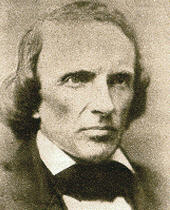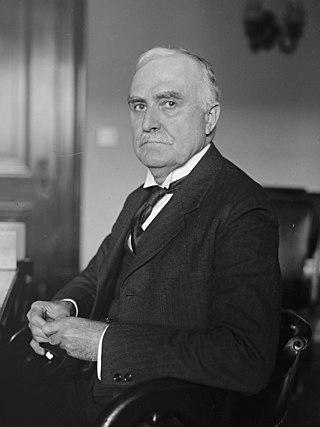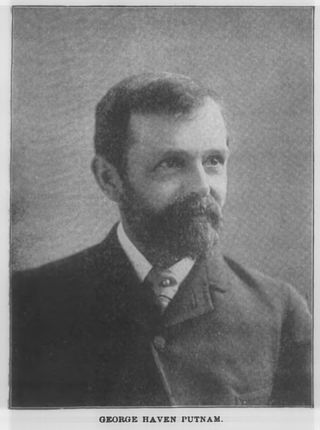Related Research Articles

John Torrey was an American botanist, chemist, and physician. Throughout much of his career, he was a teacher of chemistry, often at multiple universities, while he also pursued botanical work, focusing on the flora of North America. His most renowned works include studies of the New York flora, the Mexican Boundary, the Pacific railroad surveys, and the uncompleted Flora of North America.

John Beatty was an American banker and statesman from Sandusky, Ohio. He served as a brigadier general in the Union Army during the American Civil War.

William Henry Channing was an American Unitarian clergyman, writer and philosopher.

George Washington Greene was an American historian. He was also the grandson of Major-General Nathanael Greene, a hero of the American Revolutionary War.

William Cabell Bruce was an American politician and Pulitzer Prize-winning writer who represented the State of Maryland in the United States Senate from 1923 to 1929.

George Haven Putnam A.M., Litt.D. was an American publisher, soldier, and writer. He was the president of G. P. Putnam's Sons for its first 52 years, from 1872.

Elizabeth Blackwell was an Anglo-American physician, notable as the first woman to earn a medical degree in the United States, and the first woman on the Medical Register of the General Medical Council for the United Kingdom. Blackwell played an important role in both the United States and the United Kingdom as a social reformer, and was a pioneer in promoting education for women in medicine. Her contributions remain celebrated with the Elizabeth Blackwell Medal, awarded annually to a woman who has made a significant contribution to the promotion of women in medicine.

Joseph O'Dwyer was an American physician. He developed a valuable system of intubation in diphtheria cases. O'Dwyer is often cited as the "father of laryngeal intubation in croup".

Ephraim George Squier, usually cited as E. G. Squier, was an American archaeologist, history writer, painter and newspaper editor.

Gustav Kobbé was an American music critic and author, best known for his guide to the operas, The Complete Opera Book, first published (posthumously) in the United States in 1919 and the United Kingdom in 1922.

Thomas Lloyd was a lieutenant-governor of the Province of Pennsylvania and a Quaker preacher.

Frederick William Thomas was an American writer.
Charles Wilkins Webber was an American journalist and explorer.
William Ross Wallace was an American poet, with Scottish roots, best known for writing "The Hand That Rocks The Cradle Is The Hand That Rules The World".

Samuel Luther Dana was an American chemist.
Frederick Christian Schaeffer was a Lutheran clergyman of the United States.

William Paul Gerhard was a German-American sanitary engineer.

Peter Dirck Keyser was an American ophthalmologist.
Francis Augustus Teall was an American editor.
The History of Prostitution: Its Extent, Causes and Effects throughout the World is a book published by William Wallace Sanger in 1858. It analyzes prostitution in different civilizations throughout world history with a particular focus on New York in the 1850s.
References
- This article incorporates text from a publication now in the public domain : Wilson, J. G.; Fiske, J., eds. (1900). . Appletons' Cyclopædia of American Biography . Vol. Supplement. New York: D. Appleton.
- Martin, Melissa Ellis (2006). "Sanger, William Wallace". In Melissa Hope Ditmore (ed.). Encyclopedia of Prostitution and Sex Work. Vol. 1. Greenwood Publishing Group. pp. 424–425. ISBN 9780313329685.